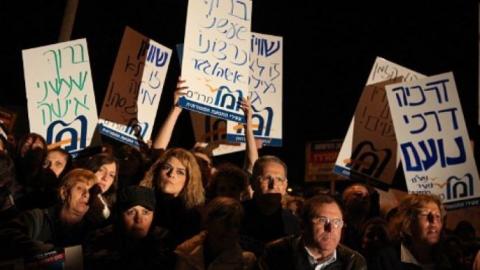State funding for gender-separate religious schools in Israel to be phased out
The ministry’s submission to the court, signed by Moshe Sagi, deputy director general and head of the ministry’s finance and budgets administration, promised that the ministry would gradually reduce the funding for separate classes over the coming four years, totally halting it during the 2018-19 school year. The ministry explained that this would be replaced in any case by a differential funding plan, which is meant to provide more funding for schools in poorer neighborhoods at the expense of funding to wealthier neighborhoods.
“The funding method under which Education Ministry budgetary allocations are made is undergoing a gradual change, under which the ‘baskets method’ will be eliminated, to be replaced by the ‘differential method,’” the ministry said. “With the completion of this process [during the 2018-19 school year] the funding for gender separation will cease.”
A table the ministry attached to its response detailed the gradual decrease in the funding of separate classes. During the 2013-14 school year, when the separation was fully funded, some 1,600 hours were allocated toward separation, at a cost of 11.5 million shekels ($3 million). During this school year the budget has dropped to 1,072 hours at 7.6 million shekels, while in the 2017-18 school year it will drop to 352 hours at a cost of 2.5 million shekels.
The ministry asked that the petition be denied in light of the ministry’s plans. “Given the position of the petitioner that it would not persist with its petition if the gender separation funding by the Education Ministry is stopped, and because with the move toward differential funding this allocation is to stop, the Education Ministry’s position is that the petition is superfluous and should be denied.”
During a hearing on the petition held in June, Justices Elyakim Rubinstein, Miriam Naor and Esther Hayut pressed state representative attorney Dana Briskman on whether the gender separation resulted in smaller classes, and Briskman conceded that this was true. Briskman also referred to other differences in funding between religious and secular schools.
“State-religious schools get a prayer hour, while the others don’t get it. It’s a need that stems from their uniqueness,” she said. While Naor wondered whether there was indeed discrimination that needed to be remedied, Rubinstein reminded her that “State-religious education is enshrined in law, and was established with a certain educational outlook. The question is equality compared to others.”
Be Free Israel said it was pleased by the ministry’s response but saw no reason why the funding shouldn’t be stopped immediately, rather than in 2019. “We’re concerned that delaying the decision is liable to empty the court’s intention of content,” said Be Free Israel’s managing director, Mickey Gitzin. “There’s no justifiable reason for the reduction to be gradual, which could lead to the next minister changing the policy, while meanwhile state-religious education continues to benefit from extra budgets.”
Attorney Eran Lev, who represented Be Free Israel, said the movement was debating whether to press and ask that the funding be stopped immediately.
Yarden Skop

